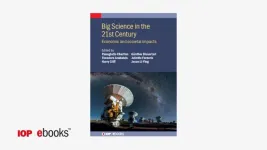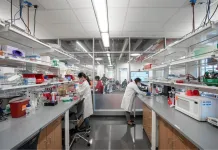(Press-News.org) CORVALLIS, Ore. – Some coral species can be resilient to marine heat waves by “remembering” how they lived through previous ones, research by Oregon State University scientists suggests.
The study, funded by the National Science Foundation, also contains evidence that the ecological memory response is likely linked to the microbial communities that dwell among the corals.
The findings, published today in Global Change Biology, are important because coral reefs, crucial to the functioning of planet Earth, are in decline from a range of human pressures including climate change, said the study’s lead author, Alex Vompe.
“It is vital to understand how quickly reefs can adapt to ever more frequent, repeated disturbances such as marine heat waves,” said Vompe, a doctoral student who works in the lab of microbiology professor Rebecca Vega Thurber. “The microbiomes living within their coral hosts might be a key component of rapid adaptation.”
Heat waves are likely to increase in frequency and severity because of climate change, he added. Slowing down the rate of coral cover and species loss is a major conservation goal, and predicting and engineering heat tolerance are two important tools.
Knowing the role microbes play in adaptation can inform coral gardening and planting efforts, Vompe said. A deeper understanding of the microbial processes, and the organisms responsible for ecological memory, can also aid in developing probiotics and/or monitoring protocols to assess and act on the quality of ecological memory of individual coral colonies.
Coral reefs are found in less than 1% of the ocean but are home to nearly one-quarter of all known marine species. They also help regulate the sea’s carbon dioxide levels and are a crucial source for scientists searching for new medicines.
Corals are made up of interconnected animal hosts called polyps that house microscopic algae inside their cells. Corals also house functionally and taxonomically diverse bacteria, viruses, archaea and microeukaryotes. The community of bacteria and archaea living within corals are referred to as the coral microbiome.
Symbiosis is the foundation of the coral reef ecosystem as these microbes benefit coral hosts by assisting in carbon, nitrogen and sulfur cycling, essential vitamin supplementation, and protection against pathogens. The coral polyps in turn provide nutrition and protection to the algae and bacteria.
Climate change is threatening coral reefs in part because some of the relationships between coral and their microbes can be stressed by warming oceans to the point of dissolution – a collapse of the host-microbe partnerships, which results in a phenomenon known as coral bleaching.
“But Acropora retusa, a prevalent coral species in the Mo’orean coral reef that we studied, appears to have a powerful ecological memory response to heat waves that the microbiome seems to play a role in,” Vompe said. “This means some coral species may be more resilient to climate change than previously thought.”
Vompe, Vega Thurber and colleagues at OSU, the University of California, Santa Barbara, Arizona State University, and the University of Essex spent five years studying 200 coral colonies at a reef on the north shore of Mo’orea, French Polynesia. Mo’orea is an island in the South Pacific, roughly halfway between Australia and South America.
Because of the reef’s recent history, it presented a unique opportunity to examine heat wave response, the researchers said.
In 2010, crown-of-thorns starfish and a cyclone destroyed more than 99% of the corals, effectively hitting the reset button on the reef. Corals reestablished and went through comparatively minor heat wave events in 2016 and 2017 before experiencing the area’s most severe marine heat wave in recorded history between December 2018 and July 2019.
The second-most severe heat wave soon followed, between February and July of 2020.
“We observed that some species of coral seem to remember exposure to past marine heat waves and maintain a higher level of health in subsequent heat waves,” Vega Thurber said. “And Acropora retusa’s memory response was strongly linked to changes in its microbiome, supporting the idea that the microbial community has a part in this process.”
Cauliflower corals in the genus Pocillopora stayed in good health through the heat events, and their microbiomes also showed an ecological memory response, she noted. They were perturbed by the initial 2019 heat wave but recovered to their predisturbance state despite the second heat wave in 2020.
“Members of coral microbial communities have unique biological features that make them more adaptable and responsive to environmental change – short generation cycles, large population sizes and diverse metabolic potential,” Vega Thurber said. “In two of the three coral species we focused on, we identified initial microbiome resilience, host and microbiome acclimatization, or developed microbiome resistance to repeated heat stress. The latter two patterns are consistent with the concept of ecological memory.”
Other Oregon State researchers involved the research were Thomas Sharpton, Hannah Epstein and Emily Schmeltzer. Sharpton is an associate professor of microbiology and statistics; Epstein was a postdoctoral researcher during the study and is now a lecturer at the University of Essex; Schmeltzer, a doctoral student in Vega Thurber’s lab, has graduated and is working as a biologist with the U.S. Geological Survey.
The Gordon and Betty Moore Foundation also supported this research.
END
Some coral species might be more resilient to climate change than previously thought
2023-12-18
ELSE PRESS RELEASES FROM THIS DATE:
Big Science in the 21st Century – a new ebook published by IOP Publishing
2023-12-18
IOP Publishing is proud to announce the release of ‘Big Science in the 21st Century’, a comprehensive exploration of the impact of Big Science on our society and the new perspectives it opens on evaluating its societal benefits.
Authored by a diverse group of contributors, the book offers a multifaceted view of the challenges, merits, and transformations of Big Science across different disciplines and geographical boundaries. It delves into the transformative role of Big Science in shaping the world we live in, from its historical roots in the aftermath of the Second World War to its contemporary ...
Researchers invent "methane cleaner": Could become a permanent fixture in cattle and pig barns
2023-12-18
In a spectacular new study, researchers from the University of Copenhagen have used light and chlorine to eradicate low-concentration methane from air. The result gets us closer to being able to remove greenhouse gases from livestock housing, biogas production plants and wastewater treatment plants to benefit the climate. The research has just been published in the journal Environmental Research Letters.
The Intergovernmental Panel on Climate Change (IPCC) has determined that reducing methane gas emissions will immediately reduce the rise in global temperatures. The gas is up to 85 times more potent ...
Algae as a surprising meat alternative and source of environmentally friendly protein
2023-12-18
With more of us looking for alternatives to eating animals, new research has found a surprising environmentally friendly source of protein – algae.
The University of Exeter study has been published in The Journal of Nutrition and is the first of its kind to demonstrate that the ingestion of two of the most commercially available algal species are rich in protein which supports muscle remodeling in young healthy adults. Their findings suggest that algae may be an interesting and sustainable alternative to animal-derived protein with respect to maintaining and building muscle.
Researcher Ino Van Der Heijden ...
Unconventional cancer research consortium created with $3.2M grant from US Department of Defense
2023-12-18
Funding an unconventional approach to fighting cancer that emphasizes the integration of diverse scientific disciplines, the U.S. Department of Defense has awarded $3.2 million to establish the Convergent Science Cancer Consortium (CSCC), led by Dean’s Professor of Biological Sciences Peter Kuhn at the USC Dornsife College of Letters, Arts and Sciences.
The consortium, which includes Stanford University, Cedars-Sinai Medical Center and Children’s Hospital Los Angeles as inaugural members, unites experts from fields such as biology, engineering, mathematics and computer science, to discover more effective treatment strategies ...
Psychedelic psilocybin-assisted therapy reduces depressive symptoms in adults with cancer and depression
2023-12-18
Results from a phase II clinical trial indicate that psilocybin, a hallucinogenic chemical found in certain mushrooms of the genus Psiloybe, may benefit individuals with cancer and major depression. Trial participants treated with psilocybin not only experienced a lessening of depressive symptoms but also spoke highly of the therapy when interviewed at the end of the trial. The findings are published by Wiley in two articles appearing online in CANCER, a peer-reviewed journal of the American Cancer Society.
By binding to a specific subtype of serotonin receptor in the brain, psilocybin can cause alterations to mood, ...
Parents’ top resolutions: More patience, less time on phones
2023-12-18
ANN ARBOR, Mich. – Among many parents’ top resolutions for the New Year: More patience, less time on phones, better consistency with discipline and healthier family habits.
Their tweens and teens are setting goals too – including achievements related to grades and school, success in an activity, exercise and nutrition and earning money, according to the University of Michigan Health C.S. Mott Children’s Hospital National Poll on Children’s Health.
Nearly three in four parents polled report making ...
Few patients receive opioid agonist therapy after opioid overdose, despite benefits
2023-12-18
In the week following any hospital visit for an overdose, only 1 in 18 people with opioid use disorder begin a treatment known to be highly effective in reducing illness and deaths, according to new research in CMAJ (Canadian Medical Association Journal) https://www.cmaj.ca/lookup/doi/10.1503/cmaj.231014.
“These results highlight critical missed opportunities to prevent future mortality and morbidity related to opioid use, despite connection to health care for many patients in the days after a toxicity event,” writes Dr. Tara Gomes, a researcher at ...
Time to move on from ‘doctor knows best’, say experts, as study finds clinicians rank patient views as least important in diagnosis
2023-12-18
Experts today call for more value to be given to patients’ ‘lived experiences’ as a study of over 1,000 patients and clinicians found multiple examples of patient reports being under-valued.
The research, led by a team at the University of Cambridge and Kings’ College London, found that clinicians ranked patient self-assessments as least important in diagnostic decisions, and said that patients both over- and under-played their symptoms more often than patients reported doing so.
One patient shared the common feeling of being disbelieved ...
Stalled progress toward eliminating child marriage in India
2023-12-16
Embargoed for release: Friday, December 15, 6:30 PM ET
Key points:
Using national data between 1993 and 2021, researchers observed that India’s national prevalence of child marriage—defined by the study as marriage before age 18—declined throughout the study period.
The decade between 2006 and 2016 saw the largest magnitude of reduction in child marriage, while the years between 2016 and 2021 saw the smallest. During these latter years, six Indian states/union territories saw increases in the prevalence of girl child marriage and eight saw increases in boy child marriage.
The study is among the first to examine how the prevalence of child marriage ...
Outsize benefit seen in trial of drug for kidney disease
2023-12-16
In a clinical trial of patients with chronic kidney disease, an experimental drug significantly reduced albuminuria — albumin in urine, a sign of kidney damage — for 50% of participants. When the experimental drug was paired with a standard-care medication, 70% of participants reportedly experienced a significant reduction in albuminuria.
The findings are published today in The Lancet. The paper’s lead author is Dr. Katherine Tuttle, a clinical professor of nephrology at the University of Washington School of Medicine and executive director for research at Providence ...






